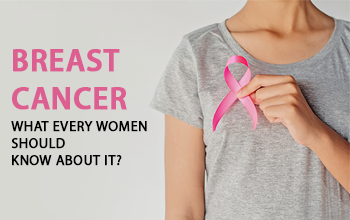Lumps in the breast are common problems in females. Only 20% of these breast lumps are cancerous. Breast cancer has replaced cervical cancer and now ranks first in cancers seen among females. The incidence of breast cancer is on the rise among Indian females, especially among younger generations. In spite of various treatment options available for treating breast cancer, the survival rates are less among Indian population compared to western population due to the presentation in advanced stages, lack of awareness about presenting symptoms and social stigma among village population.
Breast Cancer Screening
Screening is a method to diagnose an illness in its early stages with the goal to prevent death and suffering with timely medical interventions. Detection of breast cancer in the early stage has survival rates of above 95% which drops to 50% in stage III. So Screening for Breast cancer plays a major role in early detection and better treatment outcomes. Mammography, self-breast examination and examination of Breast by a trained medical professional are various screening options available.
American cancer society recommends clinical Breast Examination as the best screening modality for early detection. In India, mammography and clinical breast examination are most commonly followed modalities. Mammography is an imaging technique which helps to detect lesions in early stages which could not be appreciated by clinical palpating. Every female above 40 years of age is recommended to undergo annual screening in the form of mammography and clinical breast examination. Females with other risk factors like family history of breast and ovarian cancer, previous breast lesions are advised to undergo screening from an early age than the regular population.
Am I at Risk of Developing Breast Cancer?
In India, nearly 40 out of 1 lakh females develop breast cancer. There is a significant increase among younger females in the past few years. Risk factors for developing breast cancer can be broadly divided into modifiable and non-modifiable risk factors. Hormone replacement therapy, family history of breast, ovarian or male breast cancer, previous breast biopsy, exposure to ionizing radiation, not bearing children are all non-modifiable risk factors. Smoking, obesity, alcoholism are modifiable risk factors.
We advise to lead a healthy active life style and avoiding Smoking and alcoholism. People with non-modifiable risk factors are advised to get counselled by a doctor regarding the precautions and should understand the presenting symptoms. People with a strong family history should undergo frequent screening than people with normal risk. Strong family history can be due to an inherited genetic mutation, such individuals can undergo genetic testing only after a proper counselling with a geneticist. Genetic testing without people counselling is not advisable.
Self-Breast Examination
A self-breast examination is one of the options for females to keep themselves on a regular check. Every female should be aware of the presenting symptoms of breast cancer like a lump in the breast, bleeding from the nipple, Ulcer (wound) over the breast skin or nipple area, dimpling of the skin over the breast etc.
Self Breast Examination Includes 2 Steps :-
1) Looking at the breast in a mirror for any skin or nipple changes, any visible swellings in the breast and axillary.
2) Feeling both the breasts in lying down position on a flat surface. Feeling the breast should follow a regular pattern not to miss any part of the breast.
A self-breast examination should be done after 3-5 days of the beginning of your monthly menstrual bleeding. Females who have attained menopause can examine the same any particular day of a month.










